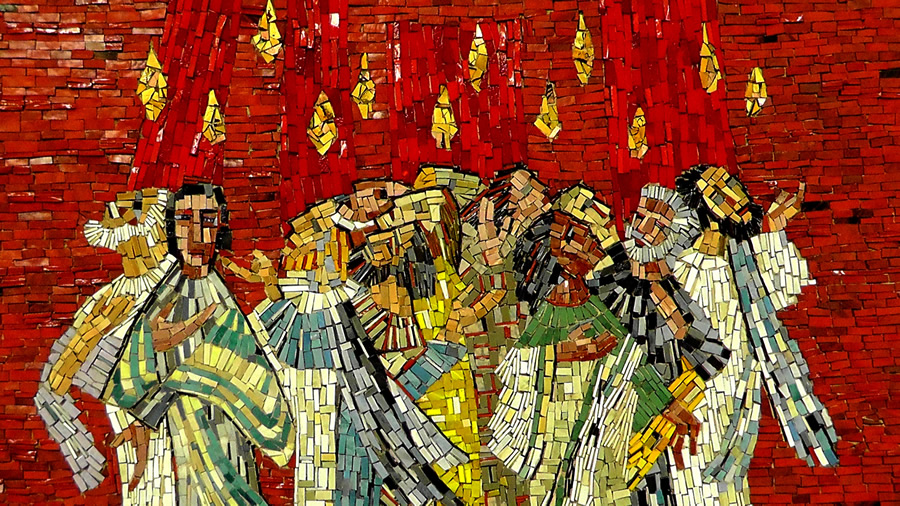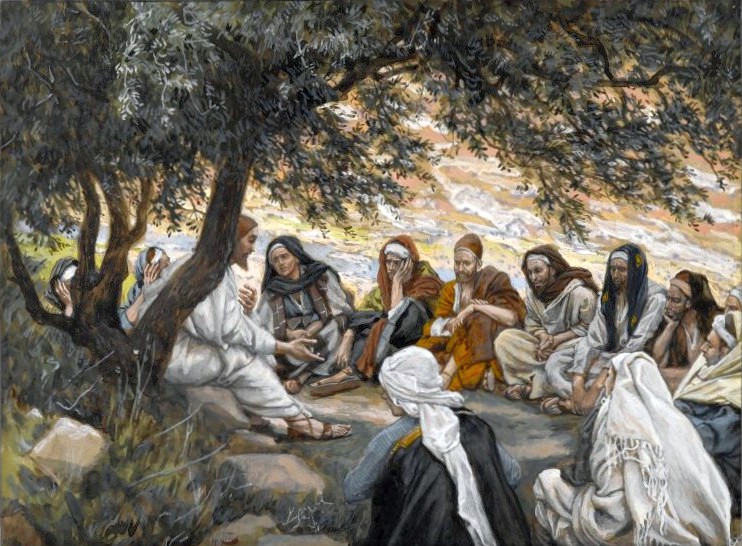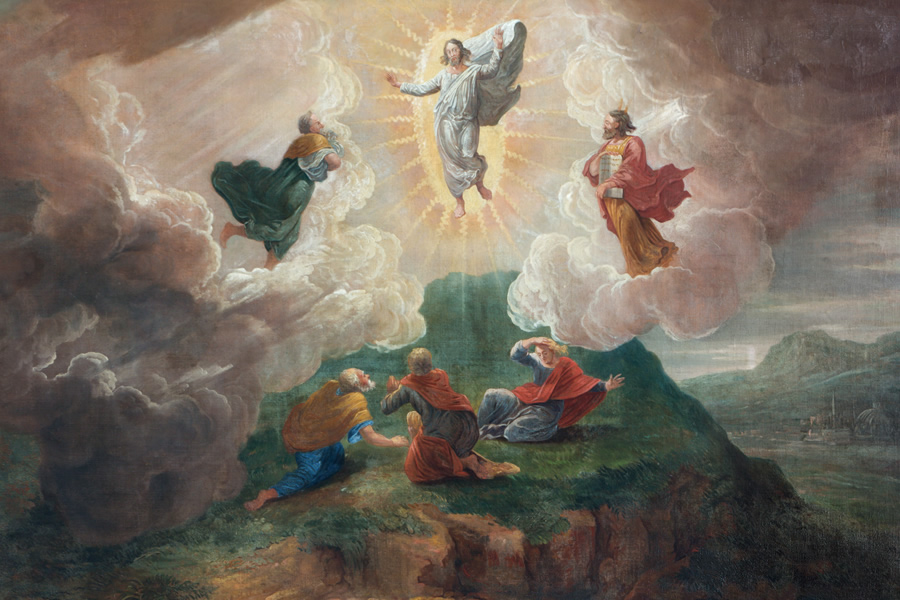
Love and Do What You Will
06-26-2022Pastoral ReflectionsRev. Brian F. ManningFor the most part, taking shortcuts to achieve a goal is counterproductive because it usually means completely redoing something later to make it what it is supposed to be. The minimal or poor effort usually produces very poor or inadequate results, as the saying goes: “if it is worth doing, it is worth doing well.” This maxim also applies to living our Catholic Way of Faith and Life.
READ MORE
The Divine Presence of Jesus is in the Blessed Bread & Wine
06-19-2022Pastoral ReflectionsRev. Brian F. ManningThis weekend we celebrate the great Feast of Corpus Christi, or as it is rendered in the English language “The Body and Blood of Jesus Christ.” Our readings this weekend are meant to be reflective of many issues regarding the Eucharist.
READ MORE
Our Description and Understanding is Always Less Than What This Great Reality Is.
06-12-2022Pastoral ReflectionsRev. Brian F. ManningAs followers of Jesus, we have come to believe in God as the Holy Trinity-one God who is Father, Son, and Holy Spirit. This is a major doctrine of our faith tradition. Certainly it is not a belief that we have an absolute clear and scientific explanation, but with time and understanding we come to recognize and accept this belief about our Triune God as powerful and meaningful in our lives. None of us can explain everything well, all of us are able to explain only some things well, whether they be religious, mechanical or natural science. I remember from high school about the quadratic equation: certainly that is not easily explainable or understood by most people or in fact practically useful to people. The equation has meaning for those who use it. This weekend we celebrate the Feast of the Most Holy Trinity, a feast which has meaning and power in our lives, but not all that easy to explain.
READ MORE
Perform the Mission By, Through, With and in the Gift of the Holy Spirit
06-03-2022Pastoral ReflectionsRev. Brian F. ManningOur great feast this weekend is the Feast of Pentecost, the coming of the Holy Spirit to the apostles in the upper room. Our first reading illustrates this spectacular event for one and all. The apostles cannot hide from the Holy Spirit. It clearly is the Holy Spirit who is coming to them in that upper room. WE also witness how the effects of the fire and wind do them no harm but certainly inspire them to feel the Spirit. They appear to be stunned by this special presence in the room. This first reading dramatically tells us that there is no getting away from the Holy Spirit. It is in light of the Holy Spirit that all barriers of understanding and language disappear. Every single disciple in the room understood that this spirit is holy and brings with it charity, kindness and unity. This spirit is the appearance of God’s grace and presence to everyone there, without exception.
READ MORE
Personal Prayer of Jesus Reveals That His Heart is All About Us
05-29-2022Pastoral ReflectionsRev. Brian F. ManningThis weekend our first reading is from the Book of Acts and it is all about Stephen the martyr. The story which we have today is about the last hours of the life of Stephen. The entire Chapter 7 is about Stephen, but at this Mass we read just a brief section from its end. The speech which is given early in the chapter is created by the followers of Stephen who want to give witness and testimony about Jesus, in a sense; they are the words of Stephen. Notice in the story that the death of Stephen is matched up with references to the Life and Death of Jesus.
READ MORE
The Gift of Peace
05-22-2022Pastoral ReflectionsRev. Brian F. ManningWe learn in the Gospel of this weekend that Jesus gave his apostles the gift of peace. When trying to describe this gift of peace and what peace is, we learn that it is not a lack of disagreement and is more than a feeling of tranquility. When we discover that Jesus used the word shalom and that it means the fullness of the messianic blessing which is salvation, our understanding radically shifts. This gift of peace is a special gift from God and it suffuses the apostle’s hearts on the night before Jesus died.
READ MORE
Light of Christ Always Overcomes the Darkness of Life.
05-15-2022Pastoral ReflectionsRev. Brian F. ManningThere are lots of “farewells” or “goodbyes” in life. There are the simple ones of every day when we leave home, work or a place where we meet other people. We never really think about what this “good bye” may mean. It is often simply said as the proper polite words as one leaves. We never think this may be for some extraordinary reason the last time we actually see and say “good bye” to that person. Most of us know the hurt and sorrow that comes from saying a final “goodbye” to someone we have loved. Saying “goodbye” to a dying spouse, parent, child, brother, sister, or any relative or friend can be most painful. This weekend our Gospel passage is about the “farewell” or “good bye” of Jesus. It is in fact a long discourse or passage. This “farewell” is actually an accumulation of many of the sayings and words of Jesus and placed at the Last Supper All of this passage is the last testament of Jesus before He died on the cross.
READ MORE
How well am I responsible for being a Follower of Jesus Christ?
05-01-2022Pastoral ReflectionsRev. Brian F. ManningThe major theme of the scriptures this weekend is about authority, in that all authority comes from God. It is made clear in the Old Testament reading that only God ruled over Israel and the kings held authority as a delegate of God. Sadly many of the kings of Israel forgot this simple truth. We also learn of the power and authority of Jesus in his ministry among the people. He certainly displayed unique power and authority. According to Matthew, the Gospel writer, when He says his “farewell”, He reminds them that “all power in heaven and on earth has been given to me” and that He now instructs his disciples to go “make disciples of all the nations”.
READ MORE
Believe in the Lord and ourselves as His disciples
04-24-2022Pastoral ReflectionsRev. Brian F. ManningWhat helps us to define the early church are three elements found in the first reading. You will note that the first element is the apostles. They are central because they witnessed, in a strong sense, the Resurrection. The church, as a community, is the second element. In fact one that was slowly increasing in membership. The third element is the regard others held for this community as a holy and healing group of people.All of these points come to have profound meaning in the Gospel of today where we are reminded that faith does not depend upon seeing.
READ MORE
The Transfiguration
03-13-2022Pastoral ReflectionsRev. Brian F. ManningIn the verses from the Book of Genesis just before those of today's reading, Abram has come near to the end of his rope. He is so disappointed and frustrated that he and Sarai have not been able to have children. Surprisingly, God responds to Abram's search for an answer from out of the night sky. In the starlight of the night, God makes a covenant with Abram. This is very different from the usual covenant of the weak being obliged to the powerful, rather in this covenant the powerful, namely God is obliged to the weak, namely Abram. In it, God makes it very clear that Abram does not have to do anything to earn God's generosity of descendants and land. In fact, all Abram has to do is have faith and trust that God will act on his behalf. In a sense it is quite simple: God promises, Abram trusts, and the covenant is fulfilled.
READ MORE
Faith in God
03-06-2022Pastoral ReflectionsRev. Brian F. ManningIn a very formal way, the Season of Lent begins this weekend; Ash Wednesday and the few days that follow it are “add-on” days to Lent. The scripture this weekend is the first formal launch into the Season of Lent. The scriptural message is quite clear for us in that we learn from the readings that trust in God will see us through in life. God will always act in life for us and for our ultimate good. We must simply have faith in God. Our Old Testament Reading from the Book of Deuteronomy reminds the Israelites that their (and our God) could not and would not ever forget or abandon them. The Israelites knew that when all the times they fell away from God, all they had to do was call out to God and ask him for his help and rescue.
Paul writes in his letter to the Romans about the necessity and power of faith. He tells us that those who have faith in Christ will not be put to shame. In fact, he writes that their shared faith will make them sisters and brothers in the Lord and also beneficiaries of God’s rich mercy.
READ MORE